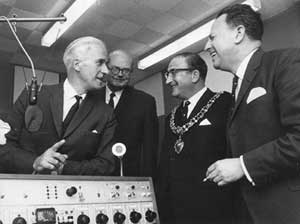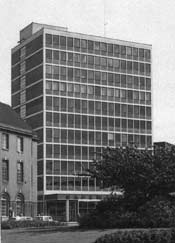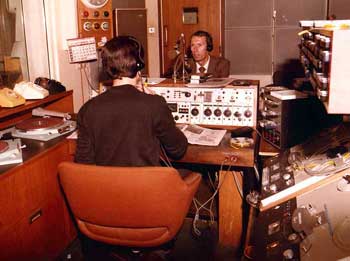
The local authority was asked to partly fund the experiment in each location and Leicester City Council contributed £50,000 for each of the two years.

On the opening day the station was visited by the Postmaster
General, the Rt. Hon. Edward Short, MP; the Director General of the BBC,
Sir Hugh Carleton Greene and the Lord Mayor of Leicester, Alderman Sir Mark
Henig. On the right is the station manager, Maurice Ennals.

BBC Radio Leicester originally occupied the entire eighth floor of Epic House, a ten storey office block above a supermarket at the end of Charles Street where it remained for the next 38 years. The studios and technical equipment always remained on the eighth floor but the ninth and tenth floors were eventually taken over in the 1970s as they became available and used to accommodate the much expanded staff which, for the final 15 years or so of the BBC's tenancy at Epic House, included much of the fledgling Asian Network.
The original sites chosen were Brighton, Durham, Leeds, Leicester, Merseyside, Nottingham, Sheffield and Stoke on Trent. A ninth site, Manchester, didn't happen because of contractual problems. At the end of the two years the BBC declared the experiment a success and announced that Phase Two of a further 12 stations would be built, this time including Manchester. Had the experiment failed the staff would all have been returned to the posts they had previously held in the BBC.
An important change was that the BBC announced that henceforth it would fully fund its local stations from the license fee with no further local contribution. However, despite this there was still a degree of hostility from some ratepayers which had been evident towards the stations from the beginning and continued until the matter was eventually forgotten - or the fully funding message finally got through! As Phase II developed Radio Durham found itself sandwiched between two new stations. Radios Newcastle and Teesside (now Cleveland) overlapped Durham's editorial area and the station was eventually closed. The staff were moved to Carlisle where a new station, Radio Cumbria, was built using the superb prototype BBC Local Radio Mk III equipment.
Another change about this time was the re-titling of the Station Engineer as Engineer-in-Charge. This had the unexpected effect of getting all 20 EiCs invited to the regular meetings of the regional and departmental EiCs within the BBC. This was important at a time when Local Radio was seen very


External links

